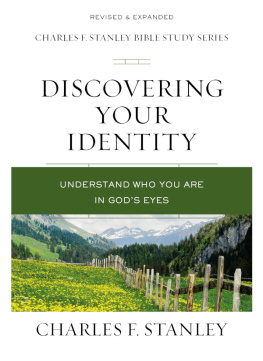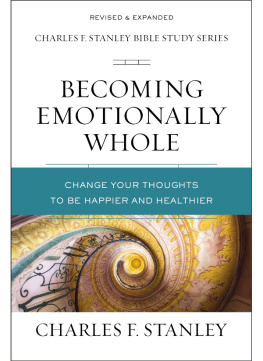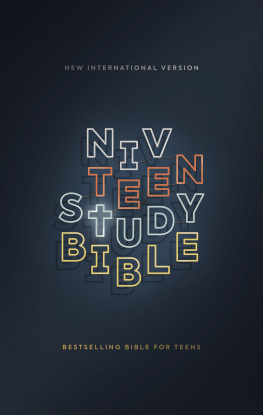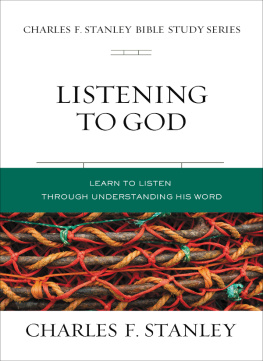In this ebook edition, please use your devices note-taking function to record your thoughts wherever you see the bracketed instructions [Your Notes] or [Your Response Here]. Use your devices highlighting function to record your response whenever you are asked to checkmark, circle, underline, or otherwise indicate your answer(s).
INTRODUCTION
A F RESH L OOK AT Y OUR
I DENTITY AS A B ELIEVER
We all have an outlook on the world and on lifea way of looking at things, valuing things, and judging things. This perspective is something we have learned. As a result, many of us today have a wrong understanding about certain things, such as our identity as believers in Christ. We truly do not know who we are in Christ. We have misconceptions about why God forgives, what salvation means to our life on this earth, and who God has called us to be.
In order to gain the right perspective, we need to go to the Word of God... and stay there. Books on self-esteem may be helpful, but only if they are firmly based on Scripture. The Bible is Gods foremost communication on the subject of self-esteem and self-identity. We must return to it continually to discover who we are, how we are to respond to lifes situations, and how we are to interact with others. Our perspective is wrong if it doesnt match up with Gods truth.
This book can be used by you alone or by several people in a small-group study. At various times, you will be asked to relate to the material in one of the following four ways.
First, what new insights have you gained? Make notes about the insights you have. You may want to record them in your Bible or in a separate journal. As you reflect on your new understanding, you are likely to see how God has moved in your life.
Second, have you ever had a similar experience? You approach the Bible from your own unique background... your own particular set of understandings about the world that you bring with you when you open Gods Word. For this reason, it is important to consider how your experiences are shaping your understanding and allow yourself to be open to the truth that God reveals.
Third, how do you feel about the material? While you should not depend solely on your emotions as a gauge for your faith, it is important for you to be aware of them as you study a passage of Scripture and can freely express them to God. Sometimes, the Holy Spirit will use your emotions to compel you to look at your life in a different or challenging way.
Fourth, in what way do you feel challenged to respond or to act? Gods Word may inspire you or challenge you to take a particular action. Take this challenge seriously and find ways to move into it. If God reveals a particular need that He wants you to address, take that as His marching orders. God will empower you to do something with the challenge that He has just given you.
Start your Bible study sessions in prayer. Ask God to give you spiritual eyes to see and spiritual ears to hear. As you conclude your study, ask the Lord to seal what you have learned so you will not forget it. Ask Him to help you grow into the fullness of the nature and character of Christ Jesus.
I encourage you to keep the Bible at the center of your study. A genuine Bible study stays focused on Gods Word and promotes a growing faith and a closer walk with the Holy Spirit in each person who participates.
LESSON 1
Y OU A RE A S AINT !
IN THIS LESSON
Learning: What exactly is a saint?
Growing: How does sainthood apply to my self-evaluation?
King David wrote, Sing praise to the L ORD , you saints of His, and give thanks at the remembrance of His holy name (Psalm 30:4, emphasis added). Look at that word saint in this verse. Is this how you see yourself? Do you regard yourself as a saint?
Each of us acts on the basis of how we view ourselves. Our opinion of self directs and focuses our behavior every hour of every day. If we have a faulty self-imagewhich is having any self-image other than what God says about uswe will behave in a way that is contrary to Gods highest purposes and plan for our lives. This is why having a correct self-image is important. It affects the way we make choices, deal with problems, and approach tasks and challenges in life. A correct self-image also impacts how we deal with other people.
Jesus taught that we are to love our neighbors as we love ourselves. He said to His disciples, You shall love the L ORD your God with all your heart, with all your soul, and with all your mind. This is the first and great commandment. And the second is like it: You shall love your neighbor as yourself. On these two commandments hang all the Law and the Prophets (Matthew 22:3740). We are to love, appreciate, value, and treat others in the same way that we love, appreciate, value, and treat ourselves.
This means that if we do not love ourselves in an appropriate way, we cannot love others as God wants us to love them. A God-based self-image is vital if we are going to relate to others in a truly Christlike way. It is also vital if we want to show the love of God to them.
Why do you think that Jesus said loving your neighbor is like loving God? Why does He list loving God first before loving others?
[Your Response Here]
Why do you think Jesus said, love your neighbor as yourself, rather than, learn to love yourself, then love your neighbor the same way? Explain.
[Your Response Here]
Why do all the Law and the Prophets hang from these two commandments?
[Your Response Here]
T HE B ASIS FOR Y OUR S AINTHOOD
The Bible says those who believe in Christ and have accepted Him as their Savior are saintsand each of us must choose to believe what the Bible says. This is not based on how we feel. Most of us do not feel like saints on any given day. But feelings come and go. What we feel is often highly unpredictable, and emotions are not a basis for making decisions about our true identity. For some people, an unruly hairdo or a spilled cup of coffee can ruin a day emotionally. No... emotions are not the basis on which we conclude that we are saints.

















